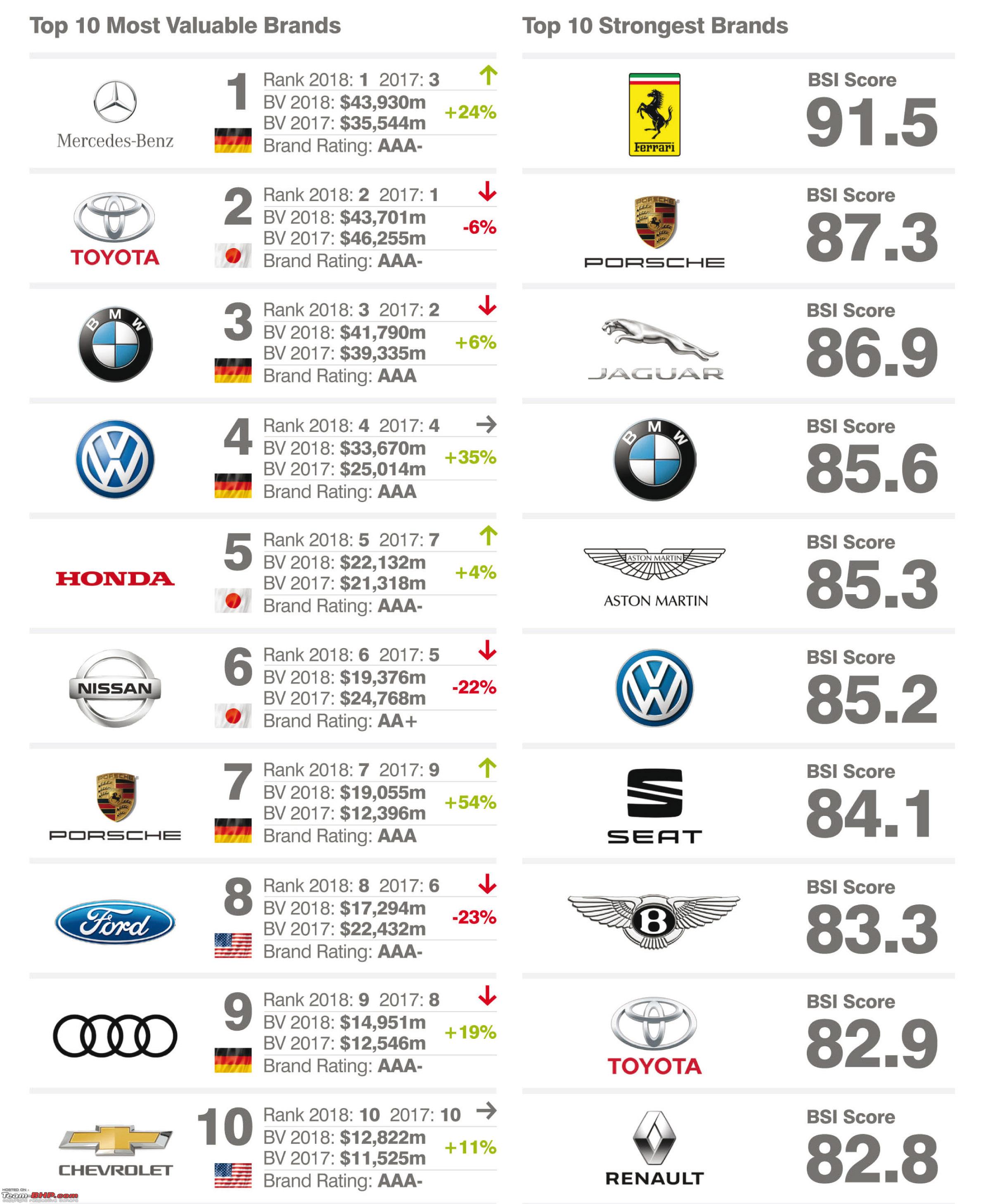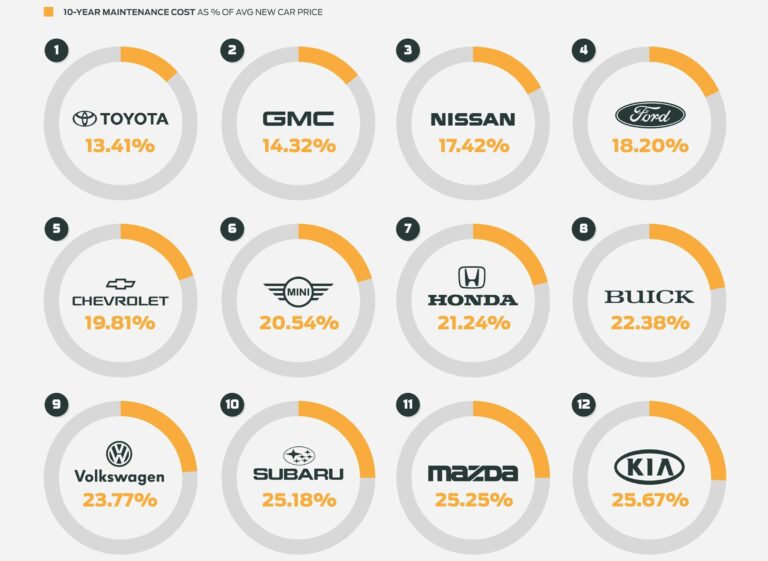Car Brands: An In-Depth Exploration of Automotive Identity and Innovation
Car Brands: An In-Depth Exploration of Automotive Identity and Innovation cars.truckstrend.com
In the vast and dynamic world of automobiles, a "car brand" is far more than just a nameplate; it is the very essence of a vehicle’s identity, a promise of a certain driving experience, and a reflection of a company’s heritage, values, and technological prowess. From the roaring engines of sports cars to the quiet hum of electric vehicles, each brand tells a unique story, shaped by decades of engineering, design, marketing, and customer interaction. Understanding car brands is crucial for consumers navigating the myriad choices available, for industry enthusiasts tracing the evolution of automotive technology, and for anyone seeking to comprehend the forces that drive one of the world’s largest and most influential industries.
A car brand encapsulates everything from the distinctive grille and logo to the underlying philosophy of its engineering, the quality of its materials, the target demographic it serves, and its reputation for reliability, performance, or luxury. It’s the cumulative result of countless decisions made over time, influencing consumer perception, fostering brand loyalty, and dictating market positioning. In an era of rapid technological advancement and shifting consumer priorities, car brands are constantly evolving, adapting to new challenges, and redefining what it means to drive.
Car Brands: An In-Depth Exploration of Automotive Identity and Innovation
I. The Essence of a Car Brand: Beyond the Badge
At its core, a car brand is a complex tapestry woven from several key threads:
- Heritage and Legacy: Many brands boast rich histories, with their origins tracing back over a century. This legacy often dictates their design philosophy, engineering focus, and perceived values. Think of Mercedes-Benz’s pioneering spirit, Ford’s mass-production legacy, or Ferrari’s racing pedigree.
- Design Philosophy: Each brand possesses a unique aesthetic language. BMW’s "kidney grille" and driver-focused interiors, Volvo’s minimalist Scandinavian design and emphasis on safety, or Tesla’s futuristic, screen-centric cabins are prime examples of how design defines a brand.
- Engineering Prowess and Technology: A brand’s reputation is often built on its engineering capabilities. Toyota is synonymous with reliability and hybrid technology, while Audi is known for its quattro all-wheel-drive and advanced infotainment systems. The commitment to innovation, whether in powertrain efficiency, safety features, or autonomous driving, is a cornerstone of brand identity.
- Target Audience and Market Positioning: Brands meticulously craft their vehicles and marketing to appeal to specific demographics. Luxury brands cater to affluent buyers seeking prestige and comfort, while mass-market brands aim for broader appeal, focusing on value, practicality, and affordability. Performance brands target enthusiasts craving speed and driving dynamics.
- Values and Promise: Beyond tangible features, brands convey intangible values. Volvo promises safety, Jeep promises adventure, and Lexus promises unparalleled customer service and refined luxury. These promises build emotional connections with consumers.
- Corporate Identity vs. Brand Identity: It’s important to note that a single automotive corporation often owns multiple distinct car brands. For example, Volkswagen Group owns Audi, Porsche, Lamborghini, Skoda, Seat, and Bentley, each with its own unique market positioning and identity. Stellantis includes Jeep, Ram, Dodge, Chrysler, Fiat, Peugeot, and Alfa Romeo. This strategy allows corporations to cover various market segments while maintaining distinct brand appeal.
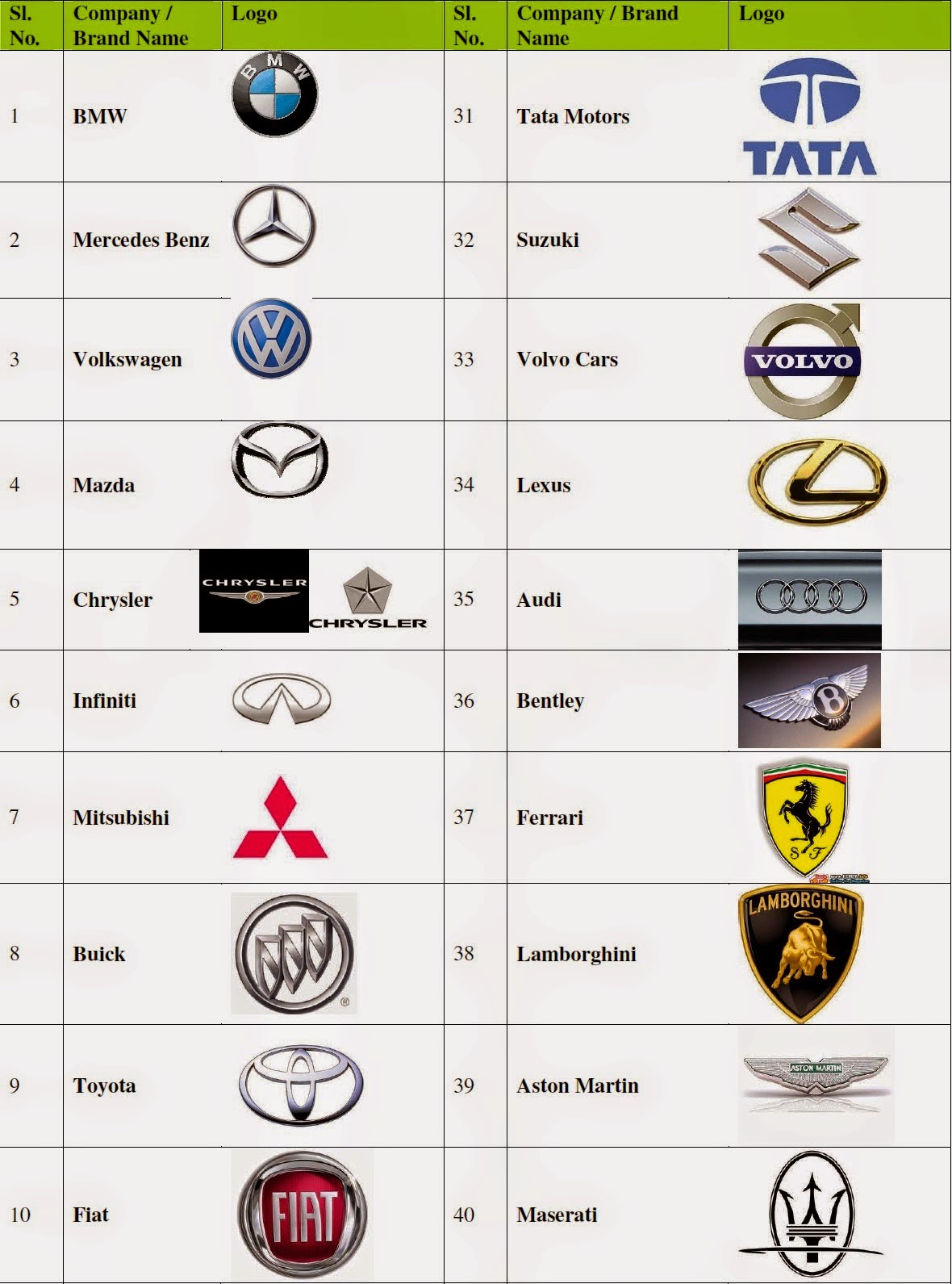
II. Major Categories of Car Brands
The automotive landscape can be broadly categorized by the type of experience or value proposition they offer:
-
Mass-Market / Volume Brands: These brands focus on broad appeal, affordability, reliability, and practicality. They aim to sell a high volume of vehicles, catering to everyday transportation needs.
- Examples: Toyota, Honda, Ford, Volkswagen, Hyundai, Kia, Nissan, Chevrolet.
- Characteristics: Wide range of models (sedans, SUVs, trucks), competitive pricing, good fuel economy, extensive dealer networks, focus on reliability and low cost of ownership.
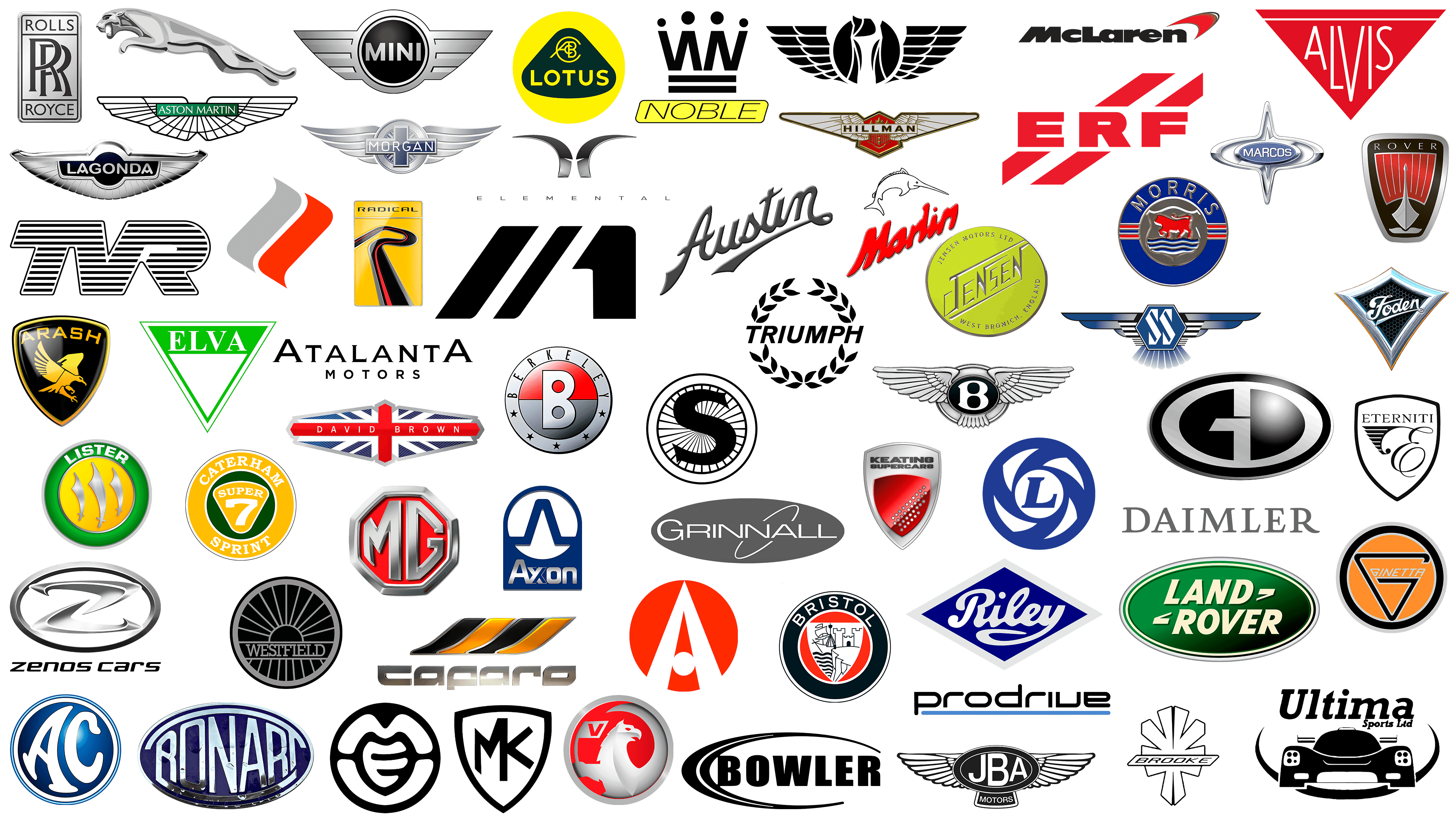
-
Luxury Brands: Synonymous with prestige, superior comfort, advanced technology, and high-quality materials. These brands offer an elevated driving and ownership experience.
- Examples: Mercedes-Benz, BMW, Audi, Lexus, Cadillac, Porsche, Genesis (Hyundai’s luxury arm).
- Characteristics: Premium interiors, powerful engines, cutting-edge infotainment, advanced safety features, sophisticated design, higher price points, often exceptional customer service.
-
Performance / Sports Car Brands: Dedicated to speed, agility, and exhilarating driving dynamics. These vehicles are engineered for performance above all else.
- Examples: Ferrari, Lamborghini, McLaren, Porsche (also in luxury), Aston Martin, Lotus.
- Characteristics: High-horsepower engines, advanced suspension systems, lightweight construction, aggressive styling, limited production numbers, very high price points.
-
Electric Vehicle (EV)-Focused Brands: While many traditional brands are now producing EVs, some companies have emerged specifically to focus on electric propulsion and sustainable mobility.
- Examples: Tesla, Rivian, Lucid Motors, Nio (China).
- Characteristics: Zero emissions, long electric range, rapid acceleration (often), advanced battery technology, emphasis on software and connectivity, often innovative direct-to-consumer sales models.
-
Niche / Specialty Brands: These brands carve out a specific identity by focusing on a particular capability or market segment.
- Examples: Jeep (off-road capability), Subaru (all-wheel-drive and boxer engines), Volvo (safety and Scandinavian design), Ram (heavy-duty trucks).
- Characteristics: Strong brand identity tied to a specific feature or lifestyle, loyal customer base.
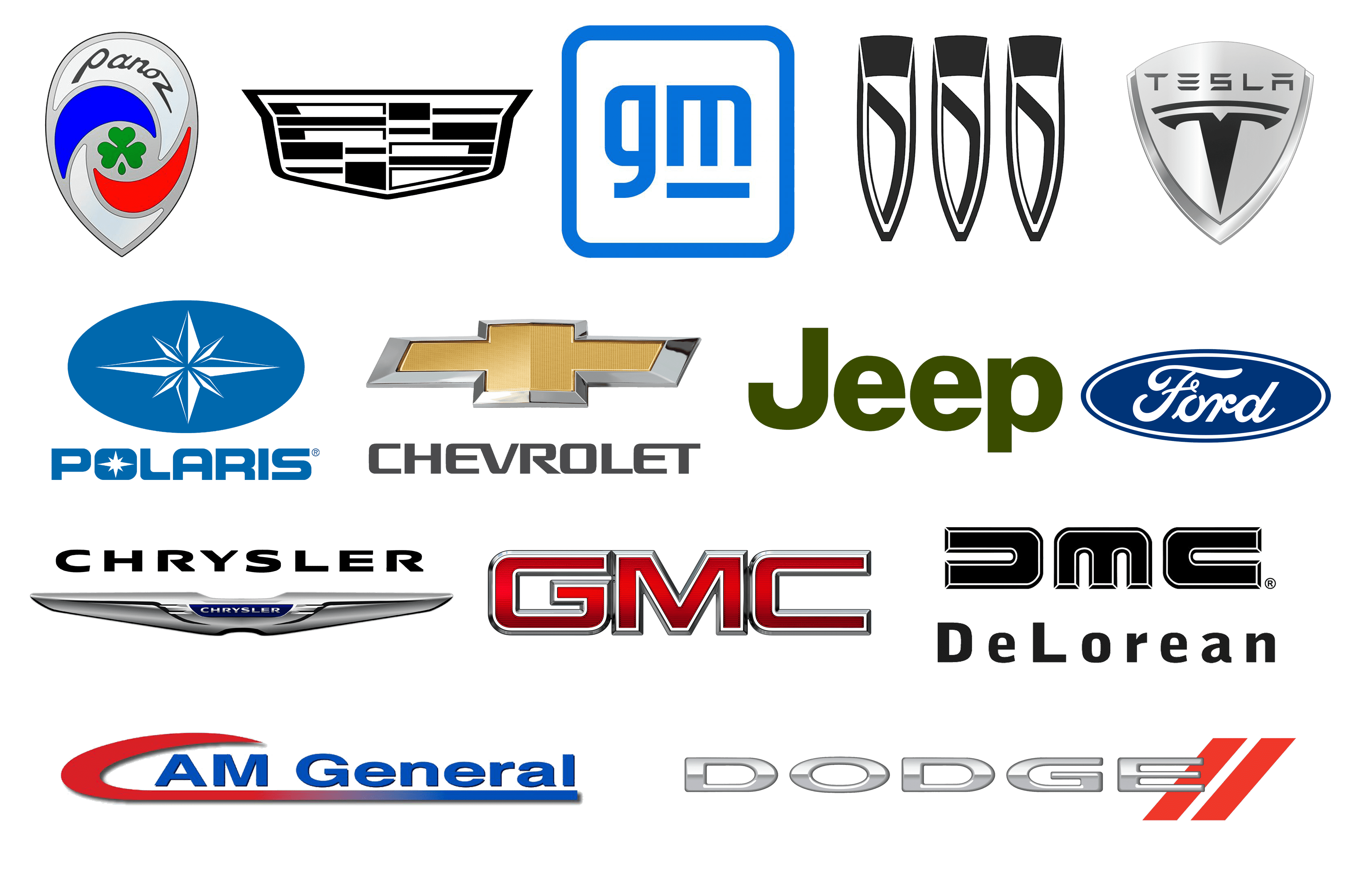
III. How Car Brands Evolve and Compete
The automotive industry is in a constant state of flux, driven by technological advancements, changing consumer demands, and global economic shifts. Car brands must evolve to remain relevant and competitive.
- Innovation as a Driving Force: The shift towards electrification, autonomous driving, and advanced connectivity is fundamentally reshaping brands. Companies are investing billions in R&D to develop new platforms, battery technologies, and AI-driven systems. Brands like General Motors and Ford are actively transitioning their entire lineups to electric vehicles, launching new sub-brands or dedicated EV lines.
- Market Trends and Adaptability: The global rise of SUVs and crossovers, the increasing demand for sustainable mobility, and the growing interest in subscription-based services or shared ownership models force brands to adapt their product portfolios and business models.
- Acquisitions and Alliances: The industry has seen significant consolidation, with large automotive groups forming to share resources, technology, and market reach. Mergers like Fiat Chrysler Automobiles and PSA Group forming Stellantis, or the vast Volkswagen Group, demonstrate how alliances allow brands to leverage economies of scale and diverse portfolios.
- Branding and Marketing: In a crowded market, effective branding and marketing are paramount. Brands invest heavily in storytelling, digital marketing, experiential events, and social media engagement to build emotional connections with consumers and differentiate themselves. The shift from horsepower wars to sustainability narratives is a clear example of evolving brand messaging.
IV. Important Considerations When Choosing a Car Brand
For consumers, selecting a car is often synonymous with choosing a brand. Here’s practical advice and actionable insights for navigating this decision:
- Reliability and Durability: Research independent reliability studies (e.g., J.D. Power, Consumer Reports, RepairPal). Brands like Toyota, Honda, and Lexus consistently rank high for long-term dependability, which translates to lower maintenance costs and peace of mind.
- Safety Features and Ratings: Prioritize brands known for their commitment to safety. Check crash test ratings from organizations like the National Highway Traffic Safety Administration (NHTSA) in the US or Euro NCAP. Look for advanced driver-assistance systems (ADAS) like automatic emergency braking, lane-keeping assist, and blind-spot monitoring. Volvo, Subaru, and Mercedes-Benz often lead in this area.
- Resale Value: Consider how well a brand’s vehicles retain their value over time. Brands with strong reputations for reliability and desirability, like Toyota, Honda, and some luxury SUVs (e.g., Porsche Cayenne), tend to have better resale values, reducing the total cost of ownership.
- Cost of Ownership: Beyond the purchase price, factor in fuel efficiency, insurance costs, routine maintenance schedules, and the availability/cost of parts. Some premium brands have higher service costs due to specialized parts and labor.
- Driving Experience: Test drive vehicles from various brands to find what suits your preferences. Do you prioritize a smooth, quiet ride (Lexus, Cadillac), sporty handling (BMW, Mazda), or rugged capability (Jeep, Land Rover)?
- Brand Reputation and Customer Service: Research a brand’s reputation for customer satisfaction, both at the dealership level and for post-sales support. A positive ownership experience often extends beyond the car itself.
- Environmental Impact: If sustainability is a priority, explore brands that are committed to electrification, use sustainable materials, and have transparent environmental policies. Tesla, Polestar, and many European brands are making significant strides here.
V. Challenges and Future of Car Brands
The automotive industry faces unprecedented challenges that will redefine car brands in the coming decades:
- The Electrification Transition: The enormous cost of developing EV platforms, batteries, and charging infrastructure, coupled with consumer range anxiety and charging availability, poses a massive challenge. Brands must convince consumers to make the switch while maintaining profitability.
- Supply Chain Disruptions: Global events, from pandemics to geopolitical tensions, have exposed vulnerabilities in the automotive supply chain, particularly for semiconductors. Brands must build more resilient and diversified supply networks.
- New Entrants and Competition: Tech giants and agile startups (e.g., Apple Car rumors, Chinese EV makers like BYD) are entering the automotive space, challenging established brands with fresh perspectives on design, technology, and sales models.
- Shifting Consumer Preferences: The younger generation is often less focused on car ownership, preferring ride-sharing, subscription services, or public transport. Brands must adapt their offerings to cater to "mobility as a service" rather than just vehicle sales.
- Data Privacy and Cybersecurity: As cars become more connected and autonomous, the handling of personal data and protection against cyber threats will become critical brand responsibilities.
Concluding Summary
Car brands are the beating heart of the automotive industry, embodying a complex blend of history, design, engineering, and customer promise. They guide consumer choices, drive innovation, and shape the future of mobility. From the mass-market workhorses to the exclusive supercars, each brand offers a unique value proposition, meticulously crafted to appeal to specific desires and needs.
As the industry hurtles towards an electric, autonomous, and connected future, car brands face immense pressure to adapt, innovate, and redefine their identities. Those that succeed will be the ones that not only embrace new technologies but also remain true to their core values, offering compelling products and experiences that resonate with evolving consumer demands. Ultimately, a car brand is a living entity, constantly evolving, but always striving to leave an indelible mark on the road and in the minds of drivers worldwide.
Car Brand Category Overview & Estimated Price Ranges
It’s important to note that exact prices vary wildly by specific model, trim level, optional features, region, and market conditions. The "Typical Price Range" below represents the general spectrum for new vehicles within that brand category, excluding ultra-rare or highly customized models.
| Brand Category | Representative Brands | Typical Price Range (USD) | Key Characteristics & Focus |
|---|---|---|---|
| Mass-Market | Toyota, Honda, Ford, VW, Hyundai, Kia | $20,000 – $55,000 | Reliability, Value, Practicality, Broad Appeal, Fuel Efficiency |
| Luxury | Mercedes-Benz, BMW, Audi, Lexus, Genesis, Volvo | $45,000 – $150,000+ | Prestige, Comfort, Advanced Tech, Premium Materials, Performance |
| Performance/Sports | Porsche, Ferrari, Lamborghini, McLaren, Aston Martin | $80,000 – $500,000+ | Speed, Handling, Exclusivity, Driving Dynamics, High Power |
| EV-Focused | Tesla, Rivian, Lucid Motors, Polestar | $40,000 – $250,000+ | Electric Propulsion, Cutting-Edge Tech, Sustainability, Range |
| Niche/Utility | Jeep, Subaru, Ram, Land Rover | $30,000 – $90,000 | Specific Capability (Off-road, AWD, Heavy-Duty), Lifestyle |
Note: Prices are approximate and subject to change. They represent MSRP ranges for new vehicles and do not include taxes, fees, or incentives.
Frequently Asked Questions (FAQ) about Car Brands
Q1: What makes a car brand "premium" or "luxury"?
A1: Luxury car brands distinguish themselves through superior craftsmanship, high-quality materials (e.g., genuine leather, real wood/metal trim), advanced technology features often debuted in their vehicles, powerful and refined engines, exceptional comfort, and often, a higher level of customer service and prestige associated with ownership. They typically command higher prices and have a strong emphasis on brand heritage and exclusivity.
Q2: Are all car brands owned by a few large corporations?
A2: While it might seem that way, a significant portion of the global automotive market is indeed controlled by a handful of large multi-brand corporations. Examples include Volkswagen Group (VW, Audi, Porsche, Lamborghini, Bentley, Skoda, Seat), Stellantis (Jeep, Ram, Dodge, Chrysler, Fiat, Peugeot, Alfa Romeo, Maserati), General Motors (Chevrolet, GMC, Cadillac, Buick), and Toyota Motor Corporation (Toyota, Lexus, Daihatsu, Hino). This allows for shared platforms, technologies, and economies of scale. However, there are still independent manufacturers and emerging startups, particularly in the EV sector.
Q3: Which car brands are generally considered the most reliable?
A3: Brands like Toyota and its luxury division Lexus consistently rank at the top for reliability in various independent studies (e.g., J.D. Power, Consumer Reports). Honda is also frequently lauded for its dependability. These brands are known for their meticulous engineering, durable components, and rigorous quality control, which translates to fewer mechanical issues and lower long-term maintenance costs for owners.
Q4: How do new EV brands like Tesla or Rivian compete with established traditional car brands?
A4: New EV brands compete by focusing exclusively on electric propulsion, allowing them to design vehicles from the ground up for electric powertrains, often leading to innovative packaging, unique software experiences, and rapid performance. They often leverage direct-to-consumer sales models, cutting-edge battery technology, and a strong emphasis on connectivity and autonomous driving capabilities, appealing to tech-savvy consumers looking for a departure from traditional automotive norms. Established brands are responding by accelerating their own EV development and marketing their extensive dealer networks and long-standing reputations.
Q5: Is it better to choose a car based on a specific brand or an individual model?
A5: It’s generally best to consider both. A brand gives you an initial understanding of what to expect in terms of reliability, quality, and overall philosophy. For example, if you prioritize safety, Volvo is a strong brand to start with. However, individual models within a brand can vary significantly in terms of features, performance, and suitability for your needs. Always research specific models, read reviews, and take test drives to ensure the vehicle meets your requirements, regardless of the brand’s reputation. A great brand can have a less-than-stellar model, and vice-versa.
